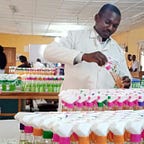stablishing Viable Technologies in the Fight Against Covid-19
“The virus doesn’t’ move, people move it. When we stop moving, the virus stops moving, it dies. It’s that simple” (Unknown).
The quote above has become very popular with influencers around the world in campaigning for people to stay at home and remain safe from the coronavirus, (COVID -19), pandemic. Community transmission is one of the most difficult of all forms of transmissions of the corona virus to tackle; it is a disturbing reality in Nigeria now causing a surge in the number of cases. The number of confirmed cases has profoundly increased within the last two weeks with a total of three hundred and sixteen [316] confirmed cases and one hundred and seventeen (117) being the highest reported number of cases in a day(21st May,2020), bringing to mind the need to adopt a quick and efficient method of testing for COVID-19.
Salami O. Matthew who is a medical laboratory scientist and a lecturer with the Federal school of Medical Laboratory Science, Jos, has urged the federal government to engage medical laboratory scientists in the development of rapid diagnostic test kits. The Centres for Disease Control (CDC), which is a National Public Health Institute of the United States, in one of its publications states that “rapid diagnostic tests (RDTs) offer a useful alternative to microscopy in situations where reliable microscopic diagnosis is not available or is not available right away.” This therefore highlights the importance of RDTs kits in the fight against the corona virus in Nigeria where there are insufficient testing centres and equipment for the diagnosis and treatment of the virus. It could be recalled that in an article published earlier in the month of April Salami had called the attention of government to the need for collaboration with local medical scientists in the production of a possible vaccine to fight the corona virus.
He confirms that in strengthening the fight against the virus there are indigenous medical scientists that are already working out techniques to develop this rapid diagnostic test kits, and that he has established a link to some of these scientists. He says “if the government is ready to embrace the initiative, we are ready as medical laboratory scientists to partner with the government in seeing an end to COVID-19 through the availability of these kits.”
Random testing will go a long way in the early detection of possible cases and will significantly help in curtailing the high risks of transmission. The development and good maintenance of rapid diagnostic kits will complement the efforts of the medical personnel and the government in curbing the continuous spread of the virus and finding a lasting solution to the pandemic.
Human migration cannot easily be curtailed and this has posed a serious threat to the stability of the country in the fight against COVID-19. The federal government as well as the various state government have applied certain enforcements to curtail the movement of people and in turn stop the spread of the virus.
Recently, the Nigerian Governors forum agreed on a decision for a total interstate lock down of the nation for fourteen [14] days. This move is timely considering that community transmission of the virus worsens the spread of the virus across states. . It is in this line that Salami is calling on the government to support the massive production of rapid diagnostic test kits, so that these kits can be made available at our nation borders for onward testing of any passenger crossing the border. At this point, any passenger that tests positive will be quarantined for 14 days, and within the 14days, a molecular diagnostic test can be performed to ascertain the true COVID-19 status of such passenger depending on the sign and symptoms displayed by the person during this period
One of the simplest yet debated precautionary measures against the contraction of the corona virus has been the wearing of a protective facemask. Salami mentions that research evidences around the world show that there is a low chance of transmission of the coronavirus when an infected person wears a facemask. Many people have been of the opinion that only people who are sick ought to wear the facemask so as not to infect other people. However, with the unfolding of events as a result of the spread of the coronavirus some countries have encouraged and in some cases enforced the wearing of face mask by the citizens of their countries. Early in the month of April, the United States’ Centres for Disease Control (CDC) recommended that citizens of the country wear a facemask in public gathering especially in situations where other social distancing measures are difficult to maintain. Also, in countries such as China where the pandemic first broke out, members of the public are recommended to use the disposable non-surgical medical masks, while in places like Hong Kong citizens are encouraged to use surgical masks when taking public transport or while in crowded places. In countries such as Argentina, Chile, Czech Republic and a few others, the wearing of masks has been made mandatory for their citizens when in public.
A Wikipedia report gives the reasons cited by Chinese health officials for wearing masks even by healthy individuals. In the report the reasons given include asymptomatic transmission where individuals who may be infected with the virus show no symptom of the virus but can transmit it to other people; another reason is the impossibility of appropriate social distancing in many public places amongst other reasons. Considering certain similar factors, Salami strongly advices the Federal government of Nigeria to make it compulsory for every citizen of the country to wear facemasks emphasizing that the role of facemasks in curtailing the spread of the virus cannot be down played.
Taking the right steps as soon as possible will be the best way to preserve human life hence, whatever must be done to make the present health crisis end soonest should not be delayed.
